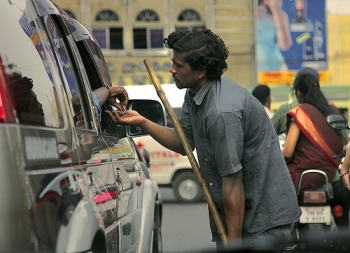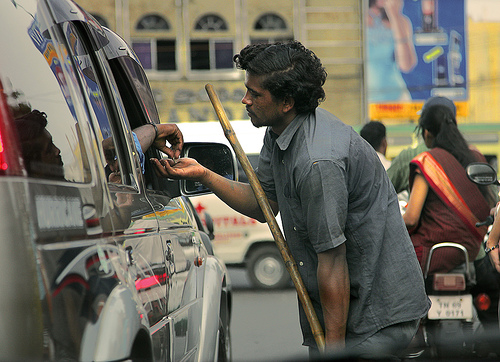
.jpg) Irudhaya Jothi
Irudhaya Jothi

A message is going round in WhatsApp and Signal groups with a title ‘Cash begging to be stopped from today’; while some approve such initiatives others doubted if this menace will ever end in India.
The message confirms that different movements have started in Mumbai, Pune, and Hyderabad to stop and eventually make cities ‘beggar free’. It suggests, ‘if any person (female/male/old/Disabled/children) is begging, we will give (food+water) instead of money, but from today they will not beg for money.’
It concludes, ‘As a result, at the international/national/state level, gangs of 'beggars' will break up and then child abduction will stop on its own.’ At one point the message suggests, ‘Keep biscuits in the car if you feel like giving, But don't pay cash.’ This nefarious message comes from the educated upper middle-class youth who unfortunately do not understand the realities on the ground.
They accuse mafia working hand-in-gloves with beggars while they are blind to the loot of the so-called business lords with the patronage of Govt.
The fear is that begging in India is going to increase by the day as starvation and food crisis knocks the rural and urban poor population of India at an alarming rate.
A recently concluded Hunger Watch survey by the Right To Food Campaign in 14 States with close to seven thousand households among vulnerable population would shock any conscious citizen.
The study was conducted among Adivasis 31%, Dalits 25%, General categories 19%, OBCs 15%, and Particularly Vulnerable Tribal Groups (PVTGs) 6 %.
The second national study was conducted in 14 states from December 2021 to January 2022. The objectives were: i) to track the hunger situation among vulnerable communities through in-person surveys, ii) to follow up the survey with local action demanding access to rights and entitlements, and iii) to draw public attention to the scale of the problem and build public consciousness about the prevailing situation of hunger among the vulnerable communities in rural and urban areas.
The National Food Security Act (NFSA), 2013, guarantees 5 kilos of cereals per person per month at highly subsidized prices to 67% of the population. However, the budgets for many of these schemes have been declining in the last few years. The budget for ICDS has seen a 38% cut in real terms in 2022-23 compared to 2014-15 and the mid-day meal scheme (MDMS) has seen nearly 50% reduction in real terms.
The Shocker: 70% of households surveyed, with working members, have total monthly income of less than Rs. 7,000. Two years into the pandemic, 66% of the respondents said that their income decreased as compared to pre-pandemic period.
Only 34% of the national sample reported that their household’s cereal consumption in the month preceding the survey was sufficient. Using the Global Food Insecurity Experience Scale (GFIES) it was found that 79% of the households surveyed in the country reported some form of food insecurity, and an alarmingly high 25% reported severe food insecurity.
41% of households reported that the nutritional quality of their diet had deteriorated compared to pre-pandemic levels. Overall, 40% of the households with working members, and 31% of the total Hunger Watch-II sample reported that current incomes are less than half pre-pandemic levels.
Close to 45% of the households had some outstanding debt. Among those with outstanding debt, 21% of the total respondents have a total debt of more than 50,000 rupees.
Decline in nutrition
Only 34% reported that their consumption of cereals in the previous month of survey was sufficient. Consumption of nutrient rich food was poor. A large proportion of households reported that they had eaten nutritious food fewer than 2-3 times a month: 28% for pulses, 28% for dark green leafy vegetables, 50% for milk or eggs, 55% for flesh foods, and 58% for fruits.
Only 27% of the respondents have reported eating eggs, meat, milk, fruits and dark green leafy vegetables more than once a week.
Compared to pre-pandemic, 41% of the respondents said that the nutritional quality and quantity of food had deteriorated. More than one-third of the respondents perceived that their food situation will remain the same or will get worse in the next three months.
67% could not afford cooking gas in the month preceding the survey.
The respondents
As many as 6,697 respondents from 14 states include Uttar Pradesh, Madhya Pradesh, Gujarat, Rajasthan, Maharashtra, Chhattisgarh, Jharkhand, Delhi, Telangana, Andhra Pradesh, Bihar, Karnataka, Himachal Pradesh and West Bengal. The rural households were 4,881 and in urban areas it was 1,816.
About 64% identified themselves as Hindus while 18% were Muslims. 71% of the respondents were women. 41% were non-agricultural casual labourers, 19% were agricultural casual labourers, 11% cultivators and 18% were regular salaried informal workers. 6% of the respondents were unemployed.
The Entitlements
84% have some kind of ration cards that give them subsidised grains (priority, AAY, state ration cards etc). 2% had other cards such as temporary cards/coupons.
Over 90% of those who had ration card that is eligible for subsidised grains, said they received some food grains, including the free grains under PMGKAY during the last six months. 68% of those who had NFSA ration cards (5936 households) said that they received free grains every month under PMGKAY during the last six months.
24% of households with eligible members reported not receiving any MDM transfers either in the form of cooked meals, dry rations or in cash; this rose to 28% for the ICDS transfers to eligible mothers or children, who are among those most vulnerable to hunger and malnourishment.
Only 13% of those eligible said they had received Pradhan Mantri Matritva Vandana Yojana maternity benefit regularly since the start of the pandemic. This number was 29% for pension payments among those households with a member eligible.
The Union Budget 2022-23 was an opportunity to absorb some shock. But it was a disaster as welfare schemes are not favoured by this corporate-centric Central government which has significantly reduced the government spending on the social sector. There is a clear downsizing of budget for welfare schemes.
The demands
Universalisation of the Public Distribution System to give subsidised rations to everyone who demands it. To begin with, the quotas under the NFSA can be expanded on the basis of the population projections for 2022 to include all vulnerable persons especially migrants workers, homeless, sex workers, trans people and all vulnerable communities even without ration cards.
Expansion of the PDS to provide millets and other nutritious commodities such as pulses and oil while procuring these at the Minimum Support Price (MSP).
Extension of the Pradhan Mantri Garib Kalyan Anna Yojana till such time that the pandemic continues, with the provision of edible oil and pulses to each household.
Ensure immediate implementation of the June 29, 2021 order of the Supreme Court, Re: Problems and Miseries of Migrant Workers (Suo Motu WP(C) 06/2020), wherein the Court directed that dry rations should be provided to all migrant workers being non ration card holders and that community kitchens should be opened to provide cooked food to people in need.
Hot cooked meals under ICDS and mid-day meals should be revived immediately. The budgets for these programmes should make adequate provisions for inclusion of eggs and nutrient-dense diet in the meals. Hot cooked meals should extend to children under three years of age through crèches and to pregnant and lactating women through community kitchens.
Maternity entitlements should be universalized and made unconditional. The amount of benefit should be increased to at least Rs 6,000 per child, as per the provisions of NFSA.
Central government contribution for social security pensions should be increased to at least Rs 2,000.
Revive National Family Benefit Scheme (NFBS) by increasing its budget and a big increase in the emergency assistance (initially Rs. 10,000 raised to Rs. 20,000 in 2012) is also required which is long overdue. Benefits should be raised to nearly Rs.1 lakh as per the initial intention to peg 80 per cent of India’s per capita GDP under NFBS benefits. The functioning of NFBS should be made transparent and simplified without delays.
Child care services must be expanded through making adequate budgetary provisions for anganwadi-cum-creches, expansion of the National Creche scheme, creches under the NREGA and so on.
Allocation for NREGA should be increased to provide at least 200 days of work per year to all rural households seeking employment, at least at the statutory minimum wage. Delays in wage payments are a direct consequence of inadequate budget allocation. A supplementary allocation to meet the demand must be made in the first quarter of the new financial year.
Wages of all workers providing care work, such as Anganwadi Workers and Helpers, ASHAs, should be enhanced and decent working conditions for them ensured.
(The writer is Convener, Right To Food Campaign, West Bengal, and a Human Rights Activist)